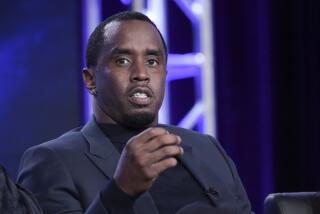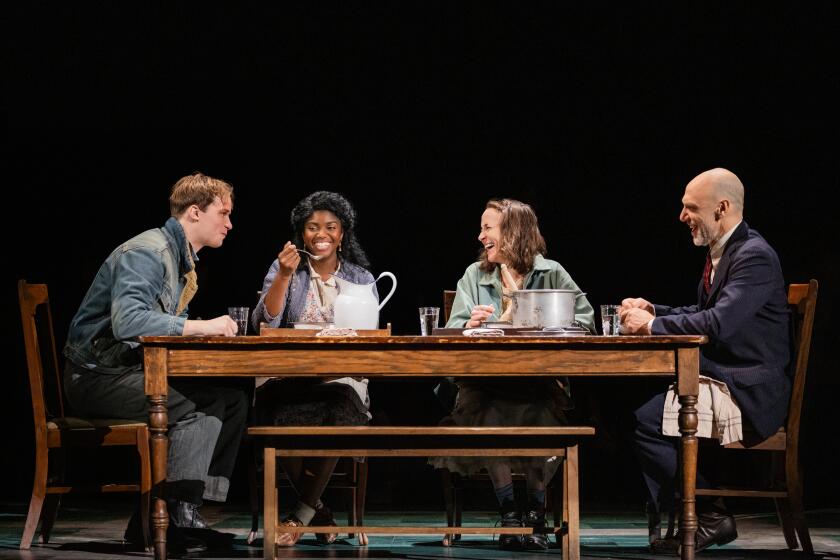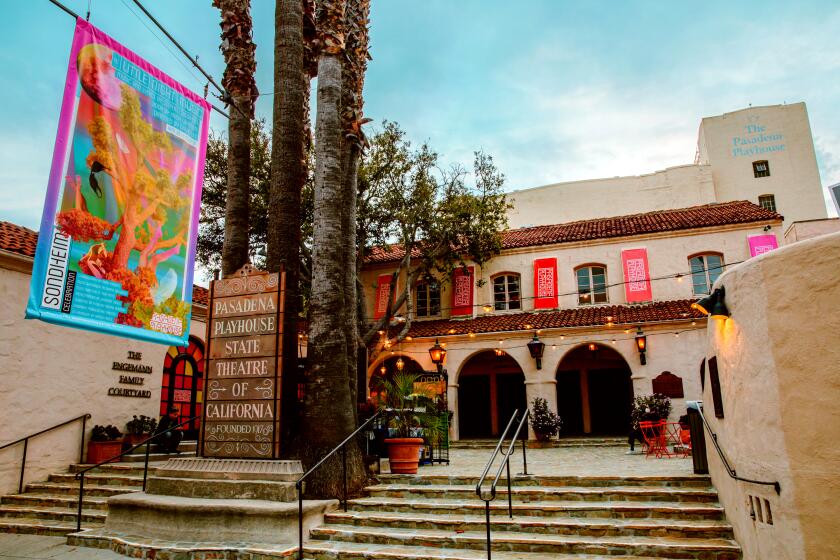Latino ‘Geniuses’ Are Giving Their Cultural Identity a Lot of Thought
Border theorist and performance artist Guillermo Gomez-Pena imagined a nation paralyzed by “an epic self-deportation” of Mexicans, forcing President Clinton to plead in pidgin Spanish for laborers to return to their jobs in el norte.
Psychologist and art scholar Amalia Mesa-Bains warned of Latinos falling victim to their own success, their modest political and economic gains serving as “the legitimization of why nothing needs to be done now.”
Poet and playwright Luis Alfaro stripped down to a sleeveless dress and chronicled his tribulations as “a queer Chicano,” subject to homophobia among his own race and to racism among fellow gays.
“Where are my heroes?” he chanted, waving a hand and then thumping his chest. “Where are my saints?”
It doesn’t take a genius to recognize that Latinos often inhabit two contradictory worlds, a duality of culture, language and geography. But when a group of Latino geniuses weighs in on that paradox, such distinctions take on a resounding depth and complexity, a defining and refining of identity that explodes simple stereotypes.
That is what happened in San Antonio last week, during the “first annual reunion” of Latinos who have been named John D. and Catherine T. MacArthur Foundation fellows, the prestigious no-strings grant commonly known as the “genius” award.
*
Since the Chicago-based foundation began anointing winners in 1981--there is no application process for the six-figure prize--there have been 502 recipients, 16 of them with Latin American roots. Twelve of those “MacArturos,” as they call themselves, were here to share their creative, sometimes quirky, almost always provocative spirit over three days of free seminars, workshops and performances.
“For San Antonio to receive one of these guests would be spectacular; to receive 12 is nothing short of historic,” said 1995 winner Sandra Cisneros, the Chicana poet and writer who conceived of the gathering. She dubbed it Ofrendas del Alma, del Corazon y de la Mente--Offerings from the Soul, the Heart and the Mind. “Genius has a responsibility,” she explained in the San Antonio Express-News. “I’d like to see us as a legion of superheroes who come to the aid of communities in peril.”
Her roster of artists, activists and academics cuts across lines of class, gender, sexuality and religion, from buttoned-down Hipolito “Paul” Roldan, a Vietnam War veteran of Puerto Rican descent who runs a low-income housing company in Chicago, to earthy Hugo Morales, a Oaxacan-born farm worker who heads Radio Bilingue, one of the nation’s first community-based bilingual networks in Fresno. Half of the 12 hailed from California, but others came from as far as Ann Arbor, Mich., and Toledo, Ohio. Ruth Behar, a cultural anthropologist, is a Cuban American Jew. Baldemar Velasquez, a migrant organizer, is a born-again Christian Tejano.
What united them was a shared sense of urgency over the plight of U.S. Latinos--the perception that their culture is celebrated by the mainstream when it comes to margaritas and mariachis, but shunned when it comes to divvying up real opportunity and power. Propositions 187 and 209, California’s twin assaults on illegal immigration and affirmative action, hung over the event like a dark cloud--reminders, as most MacArthur fellows saw it, that their existence carries negative overtones.
*
“Our house is burning,” said 1996 winner Joaquin Avila, a voting-rights attorney who has successfully challenged dozens of at-large election systems that were found to discriminate against minorities, including Los Angeles County’s. “We cannot stand aside and watch the fire continue.”
For anyone who considers himself an angry white male, or has had it with multiculturalism and the desecration of dead Europeans, there was plenty of rhetoric here that could have qualified as politically correct or self-indulgent. The formal name of the conference, for example, was the Latina-Latino MacArthur Fellows’ Reunion--Latina being distinguished from the gender-neutral Latino, and then listed first as a small antidote to a long history of machismo.
But cultural demagoguery was the last thing the participants professed to be preaching. “I want to believe that those of us who are from communities that are oppressed think in the collective ‘we’ and not in the singular ‘I,’ ” Cisneros said.
Over the three days, participants gave readings, screened films, performed theater and hosted round-table talks, much of it in the company of high school and college students. Part of the idea was to remind the next generation of Latinos that there is genius in their community, not just bleak statistics of crime and poverty.
Part of the program, however, was intensely political, a message they hoped would be heightened by the legitimacy conferred upon them by their award. It was not about demanding special favors, but about forcing this country to recognize a new reality--that the old map of Us and Them, North and South, First World and Third World, no longer fits the territory, especially when Latinos, whether in San Antonio or Los Angeles, can scarcely be called a minority.
Or as Gomez-Pena, his wild black mane cascading down the back of his leather jacket, put it: “In which world, or worlds, are you located in?”
More to Read
The biggest entertainment stories
Get our big stories about Hollywood, film, television, music, arts, culture and more right in your inbox as soon as they publish.
You may occasionally receive promotional content from the Los Angeles Times.






